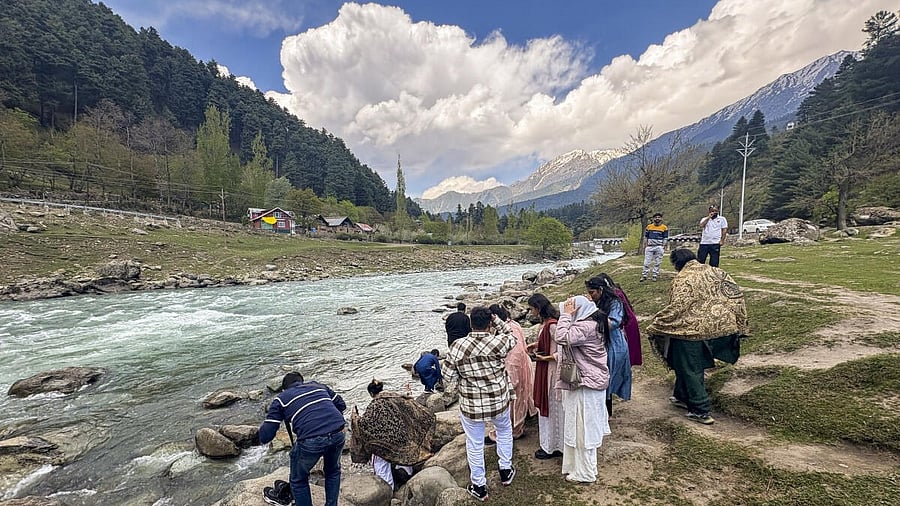
Tourists at the Pahalgam area in Kashmir on Friday.
Credit: PTI Photo
Terrorism in Kashmir has been a thorn in the flesh for India since decades. Despite momentary lull periods of relative peace, it continues to rear its ugly head periodically in the Valley.
With the abrogation of Article 370,there were expectations of increased security in the region but unfortunately terrorism continues to take innocent lives. According to data from the South Asia Terrorism Portal (SATP), an initiative by the Institute for Conflict Management, a Delhi based non profit organisation, 211 civilians and 276 military personnel have lost their lives in Kashmir due to terrorism since 2019.
The recent attack in Pahalgam is yet another dreadful example of the horrors of terrorism that the Kashmir valley has to face continuously.
One of the key reasons behind the persistence of terrorism in Kashmir has to do with the various challenges faced by the military and intelligence to track and counter terrorists.
Personnel deficiencies
Personnel shortages are a significant factor in the increased difficulty in securing the borders with Kashmir. According to a report, the Army is short of 92,410 Junior Commissioned Officers (JCOs) and Non-Commissioned Officers (NCOs), representing a 7.72 percent shortfall. Additionally, a 16.71 percent shortage in the officer cadre is also a cause for concern.
The aforementioned shortages in personnel have led to the military being stretched thin along the borders with Pakistan, causing more infiltrations into Kashmir, hence increasing the risk of terror attacks. In an interview with Republic TV, retired Indian General, G D Bakshi, reiterated the need for increased manpower to tackle the threat of terrorism.
"Our forces were cut by 1,80,000. Who did it? What about the threat assessment? You saved money. You saved money and got those people killed," Bakshi was quoted as saying in the interview.
The reduction in manpower has affected the Army’s ability to effectively engage in counter insurgency as well as limit the infiltration of terrorists into the region from Pakistan.
The need for modernisation
The need for improved equipment is also something that can allow the Indian military to have better surveillance, which has the potential to significantly improve security. For example, India currently needs to expand its arsenal of integrated surveillance and tracking systems for guarding borders. These systems will provide superior threat assessment capabilities and will also shorten response times to any infiltrations, causing a more robust defense. According to Home Minister Amit Shah, within 4 years, this system will be placed all along India’s extensive border with Pakistan.
There is also the need for significant modernisation of military hardware. According to reports, India desperately needs to purchase more modern equipment to replace its aging weaponry. For instance, the need to replace certain aging aircraft in the Air Force, such as the Mig-21 with more modern equipment is essential for India to combat both conventional military threats and threats emerging due to terrorism. There is also the need to focus on keeping the number of operational units at an acceptable level.
Intelligence failures
Intelligence failures and gaps in communication also play a significant role in allowing terrorism to continue, for instance, reports suggest that the authorities being unaware that tourists were present in the Baisaran valley was a significant reason behind the lack of security near the site of the terror attack. The presence of tourists in the region combined with the fact that an infiltration route was recently discovered in Kathua should have been a significant reason to bolster security around the region in order to ensure protection against terrorist attacks. Utmost vigilance from the authorities and better communication from private businesses such as hotels, tourism companies, etc, would act as a strong foundation for countermeasures against terrorism.
Furthermore, the failure of intelligence apparatuses such as those that occurred during the Pulwama attack of 2019, as reported by a CRPF probe make it increasingly difficult for security forces to effectively counter the threat of insurgency.
Former Army chief General Shankar Roychowdhury reportedly stated that the recent terror attack at Pahalgam also stems from an intelligence failure. In a statement to PTI, he said “We have our own intelligence agency, RAW, and we must utilise it effectively."
The quest for Justice and Retaliation
In an interview, former General Officer Commanding-in-Chief, Northern Command, Lieutenant General DS Hooda, stated that there is the need for the government to act quickly. The lack of functional diplomacy between India and Pakistan and the limited success of economic pressure leaves only a hard, kinetic military option.
“Terrorism is a theatre. You are targeting not the people you kill, but the larger population. Social media narratives will incite the people in the country and try to create Hindu-Muslim divide and that’s the intent of these terrorists. I hope people do not fall prey to such attempts,” Lt Gen Hooda said in a concluding message that reiterates the need for avoiding communal violence and avoiding chaos.